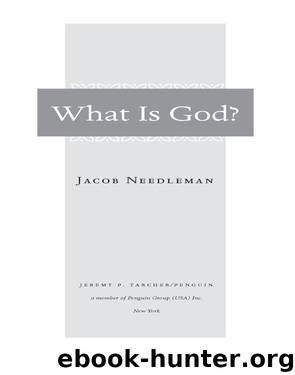What Is God? by Jacob Needleman

Author:Jacob Needleman
Language: eng
Format: epub
Publisher: Penguin Publishing Group
I immediately closed the book. I almost wept. I sat there trembling, so touched that I was unable to read further. I felt not so much that I had found something I was looking for all my short life, but that this something had found me.
I know this may sound romantic or excessive or adolescent.
And it is here that the problem of language—or something mysteriously related to the problem of language—rears its head. How to explain the powerful sense of homecoming that this one sentence called forth in me? Even now, more than half a century later, I can find no words to explain this sensation, this deep intuition. I can only resort to a certain definite experience that many of us will recognize, but which may seem odd or farfetched as an analogy to what I then experienced reading this almost prosaic philosophical sentence in this mammoth, abstract philosophical text dealing with the limits of human knowledge.
Many of us can clearly remember the experience of falling in love at first sight. Not simply immediate attraction, physical or otherwise. I mean the experience of seeing and meeting the one great love of one’s life.
Perhaps he or she walks into a room or you are introduced to her at some social event or you see him, whom you have known for many years but whom you now see as though for the first time. And you know—you know—that this man or woman is the one you have been looking for, perhaps without even being aware that you were longing for him or her.
Reading this sentence, and feeling the great weight of this book in my hands, was very much akin to that experience.
There are many love stories in the literature of nations that exist at several levels, love stories that are symbolic of man’s relationship to God. Some are tragedies, such as the story of Tristan and Isolde or, in its way, Romeo and Juliet, but even when they are tragic, or perhaps especially when they are tragic, they evoke a certain mysterious joy because they are at one level stories of man’s encounter with the Higher in one’s self and in one’s life, an encounter that destroys the everyday values of one’s everyday life; a love that risks everything that the hero and heroine have till then considered important—social values, achievements, status, success, wealth, pleasure, safety, legacy—in short, a man or woman’s ordinary identity, ordinary state of consciousness and sense of self. The hero or heroine sacrifices it all, throws himself or herself away, so to say, for the sake of this great love, even to the point of dying for the sake of this love, whether or not it is consummated. The writings of the Sufis are full of such stories—read almost any poem or tale by Rumi, Hafiz, or Mirabai.
The Hebraic tradition is also replete with such imagery, the Song of Solomon being the best-known example. But one finds this same imagery in the literature of Hasidism. There the imagery offers itself as more than imagery.
Download
This site does not store any files on its server. We only index and link to content provided by other sites. Please contact the content providers to delete copyright contents if any and email us, we'll remove relevant links or contents immediately.
The Lost Art of Listening by Michael P. Nichols(7506)
Why I Am Not A Calvinist by Dr. Peter S. Ruckman(4153)
The Rosicrucians by Christopher McIntosh(3519)
Wicca: a guide for the solitary practitioner by Scott Cunningham(3178)
Signature in the Cell: DNA and the Evidence for Intelligent Design by Stephen C. Meyer(3138)
Real Sex by Lauren F. Winner(3023)
The Holy Spirit by Billy Graham(2952)
To Light a Sacred Flame by Silver RavenWolf(2823)
The End of Faith by Sam Harris(2742)
The Gnostic Gospels by Pagels Elaine(2531)
Waking Up by Sam Harris(2460)
Nine Parts of Desire by Geraldine Brooks(2369)
Jesus by Paul Johnson(2362)
Devil, The by Almond Philip C(2331)
The God delusion by Richard Dawkins(2309)
Heavens on Earth by Michael Shermer(2284)
Kundalini by Gopi Krishna(2184)
Chosen by God by R. C. Sproul(2164)
The Nature of Consciousness by Rupert Spira(2108)
